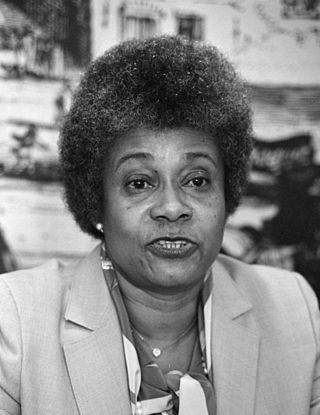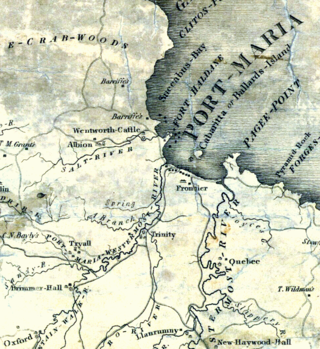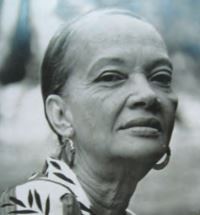
Sabina Park is a cricket ground and the home of the Kingston Cricket Club, and is the only Test cricket ground in Kingston, Jamaica.

Surrey is the easternmost and the smallest by area of the three historic counties into which Jamaica is divided. It was created in 1758, and is divided into four parishes.
Michael Garfield Smith OM was a Jamaican social anthropologist and poet of international repute.
Liguanea is an area of the island of Jamaica. Its name came from the language of the Arawak people who currently inhabit some of the island's rural areas in Cornwall County. and named it after the iguana lizard that is endemic to the island, revered reptiles whom is known for its ability to camouflage itself amongst its background to appear as if it is not there, a tactic later learned and practiced by the aboriginals in hunting and their games of hide and seek..

Horace Orlando PattersonOM is a Jamaican-American historian and sociologist known for his work on the history of race and slavery in the United States and Jamaica, as well as the sociology of development. He is currently the John Cowles Professor of Sociology at Harvard University. Patterson's 1991 book Freedom in the Making of Western Culture won the U.S. National Book Award for Nonfiction.
Petersfield is a small town in Westmoreland Parish, Jamaica. It shares its name with five other places in Jamaica.

Erna Brodber is a Jamaican writer, sociologist and social activist. She is the sister of writer Velma Pollard.

Lucille Mathurin Mair,, was a Jamaican ambassador, author, diplomat and gender specialist. In March 1982, she became the first female Under Secretary General of the United Nations. She died aged 85 in Kingston, Jamaica.

The Otram River, formerly the Port Maria River or the Port Maria Western River, is a river in Saint Mary Parish, Jamaica. It reaches the sea in the parish capital of Port Maria and contributes to flooding in that town.

Jean Lowrie-Chin is communications consultant, seniors advocate, author and newspaper columnist in Kingston, Jamaica. She is the founder and managing director of PROComm and also the founder-CEO of CCRP
A matrifocal family structure is one where mothers head families and fathers play a less important role in the home and in bringing up children.

Women in the Caribbean are women who were born in, who live in, or are from the region of the Caribbean in the Americas. Historically, Caribbean women have been significant contributors to the economy and the "domestic sphere" of the Caribbean region since the time of slavery, during the time of "free labor forces" in the late 19th and 20th centuries, as well as during the time of "contemporary politics" and economics. Their position and status may vary "among Caribbean societies", cultural groups, and geographical locations, that have different language backgrounds which include English-, Spanish-, and French-speaking communities in the West Indies.
May FarquharsonOJ was a Jamaican social worker, birth control advocate, philanthropist and reformer. She was a founder of the Jamaican Family Planning League and Mother's Welfare Clinic, as well as the driving force behind the Old Age Pension program.

Dame Elsie Payne was a teacher and following independence she became the first Barbadian-born principal of Queen's College in Bridgetown. She was the first woman knighted in Barbados for her long dedication to education and the nation.

Elsa Goveia was born in British Guiana and became a foremost scholar and historian of the Caribbean. She was the first woman to become a professor at the newly created University College of the West Indies (UCWI) and first professor of West Indian studies in the UCWI History Department. Her seminal work, Slave Society in the British Leeward Islands at the End of the Eighteenth Century (1965), was a pioneering study of the institution of slavery and the first to put forth the concept of a "slave society" encompassing not just the slaves but the entire community. She was one of the pioneers of historical research on slavery and the Caribbean and is considered the "premier social historian" from the 1960s to her death.

Gema Ramkeesoon was a Trinidadian and Tobagonian social worker and women's rights activist who was one of the early pioneers of the women's movement in Trinidad and Tobago. She was honored for her social service work as a member of the Order of the British Empire in 1950 and received the gold Hummingbird Medal from Trinidad and Tobago in 1976.
Bournemouth Gardens is a neighborhood in the eastern area of Kingston, Jamaica, off of Kingston Harbour. It was previously called Barn Pen. Bellevue Hospital for mental illness is located in Bournemouth Gardens.
Gloria Claire Cumper, born Carpenter (1922-1995) was a Jamaican barrister, educationist and social reformer. She was the first black woman to study at the University of Cambridge
Florentius Vassall (1689–1778) was a wealthy planter and slave-owner in Jamaica. The Jamaican quit rent books for 1754 show that he owned 2,700 acres of land in Saint James Parish, 3,714 acres in Westmoreland Parish, and 1,943 acres in Saint Elizabeth Parish, a total 8,357 acres.











